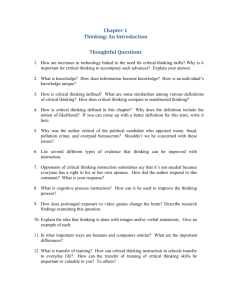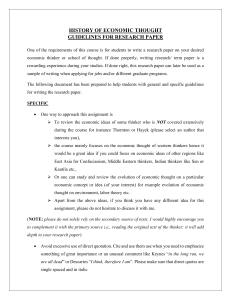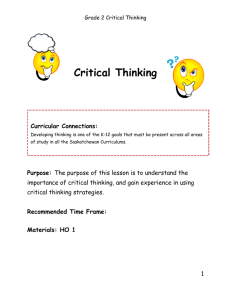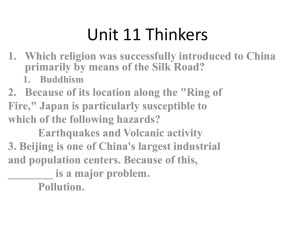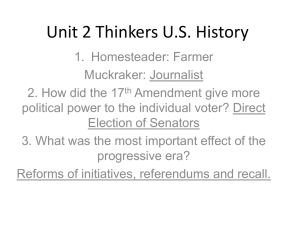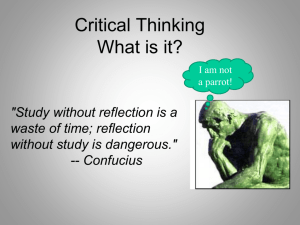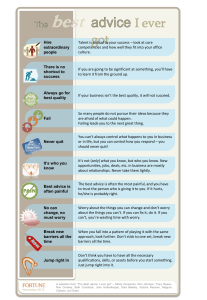Lec05CriticalThinking
advertisement
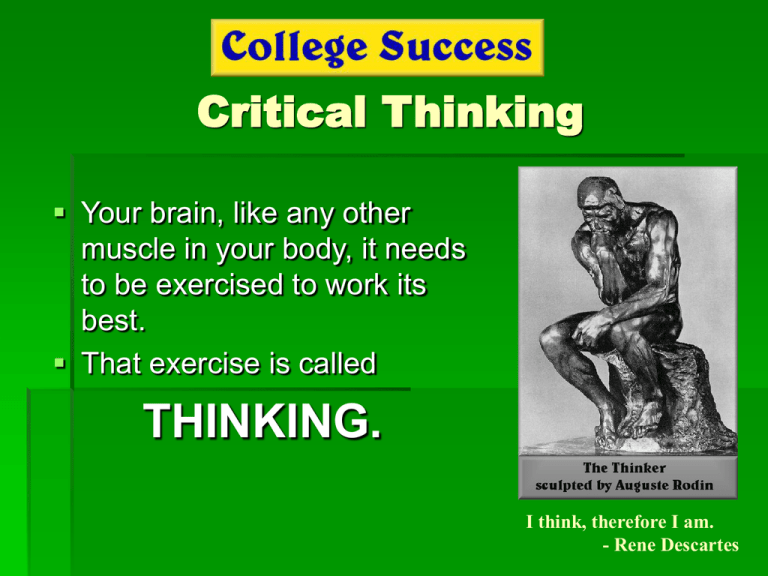
Critical Thinking Your brain, like any other muscle in your body, it needs to be exercised to work its best. That exercise is called THINKING. I think, therefore I am. - Rene Descartes What is critical thinking? Commonly called “problem solving” Not being content with the first solution to a problem, but thinking more deeply about it. It is a process of choosing alternatives, weighting them, and considering what they suggest. Critical thinking involves understanding why some people believe one thing rather than another-whether you agree with those reasoning or not Critical thinking is learning to ask questions and testing your assumptions against hard evidence. Four Aspects of Critical Thinking Abstract Thinking: Using details to discover the big ideas from large numbers of facts, seek the bigger ideas or the abstractions behind the facts. Ask yourself what are the ideas? What larger concepts the detail suggest? Creative Thinking: Seeking connections, finding new possibilities, rejecting nothing see the general idea you have found to see what further ideas it suggests. Do not reject any of your ideas. Write them all down, you will narrow this list in next stage. Systematic Thinking: organizing your thoughts into logical steps, tossing out the rubbish which of your solutions seems the most promising after you have conducted an exhaustive search for materials? Do some answers conflict with others? Which one can be believed? Do you need further to refine or further test your generalization? What further conclusion do good reasoning and evidence support? Communicative Thinking: being precise in giving your ideas to others. Critical Thinking: What is involved? Question: what is being asked? Purpose: why do I want the answer? Point of View: where do I stand to look at the question? Information: what data do I have? Concepts: what ideas are involved? Assumptions: what am I taking for granted? Inferences: what conclusions am I drawing? Consequences: what are the implications of my question? The IDEAL Method for critical thinking Yes, ladies and Identify the problem. gentlemen, it’s IDEAL! Define the problem. Explore alternative approaches. Act on the best strategies. Look back to evaluate the effects. Critical Thinkers Acknowledge personal limitations. See problems as exciting challenges. Have understanding as a goal. Use evidence to make judgments. Are interested in others’ ideas. Are skeptical of extreme views. Think before acting. Avoid emotionalism Keep an open mind Uncritical Thinkers Pretend to know more than they do. Get annoyed by problems. Are impatient. Judge on first impressions and intuition. Focus on their own opinions. Look only for ideas like their own. Are guided by feelings rather than thoughts. Claim that thinking gives them a headache. Don’t think about it, just sign it! Ask Questions Yes! Ask me! One quality of a good critical thinker is the ability to ask on-target questions. If you don’t usually ask questions, is it because you Fear embarrassment? Worry what others will think of you? Worry that the instructor will think your question is strange? Worry that others will think you’re showing off? When you don’t ask questions, you sacrifice your education. If you don’t take risks, you won’t get the maximum benefit in developing your mind. There’s No Such Thing as a Stupid Question (Usually) There are unwelcome questions. Don’t ask questions that detract from the momentum of the class. Don’t ask questions that focus more on self-concerns than on the needs of the class. Don’t ask questions that demonstrate you failed to pay attention. Don’t ask silly questions. Can I draw you a conclusion? Well, can I? Offer Criticism You will most likely be asked to judge or evaluate issues in college. First decide whether you like what you are being asked to judge. Consider both positive and negative attributes. Use examples to support your judgment. Don’t be intimidated by this kind of assignment; your instructors want you to develop your critical thinking skills. I just can’t make sense of this! Please explain more. What Makes a Creative Thinker? They actively pursue experiences that are aesthetically pleasing. They enjoy taking a unique approach to things. They love the process of creating. They are flexible and like to play with problems. They take risks and learn from their mistakes. They strive to evaluate their work fairly. They thrive when they think of assignment guidelines as a launching point for their imagination. Nurture Your Own Creativity Don’t accept other people’s blueprints. Be vigilant about what others can’t see. Differentiate the good from the bad. Take the plunge before you’re an expert. Concentrate on the big picture. Take sensible risks. Motivate yourself from inside. Shape environments that will support your creativity. Actively pursue your creative life. Critical Thinking: A Skill to Carry You Through Life Professors and future employers value your ability to perform these critical thinking skills: Manage and interpret information Examine exciting ideas and develop new ones Pose logical and cogent arguments Recognize reliable evidence Be proactive rather than reactive Think things through in depth. Always be reasonable Why College Encourages Critical Thinking Remember: Thinkers are generally “movers and shakers.” Sometimes how you solve a problem is as important as the solution. Open ended questions of “Why?”, “How?” or “What If?” have no simple, clear-cut answers. There are many valid points of view! The greatest gift a college can give you is an open mind.

